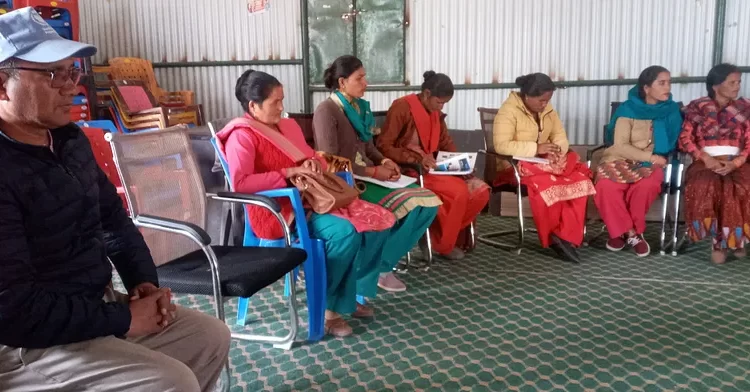When ‘the season of planning and budgeting’ begins in her municipality, Padma Tiruwa (47) embarks on a resolute mission — to help shape planning and budgetary dialogues in support of single women and Dalits. The Dalit woman of Raskot Rural Municipality– 9, Kalikot in Karnali Province goes above and beyond to arrange and attend a series of gatherings and discussions with Dalits and women. Consultations are not limited to her immediate vicinity.
The tireless single woman, also a local activist, extends her reach to neighboring and even distant areas to map specific needs of socially disadvantaged individuals, advocating for budgets with elected representatives, and assessing the extent to which approved programmes are inclusive. “Given that disadvantaged groups like Dalits, single women, elderly, and children require additional assistance and support, their specific needs must be prioritized while formulating policies and budgetary plans,” she says.
Driven by a dedication to promote gender equality, Tiruwa follows up with Ward chairs and, if needed, with the Municipality Mayor and Deputy Mayor to check whether the policies and their accompanied budgets approved by the local government remains responsive to diverse needs and perspectives of all genders. “As an informed citizen, it is my duty to hold the local authorities accountable for the integration of a gender perspective throughout the various stages of the planning and budget cycles,” Tiruwa argues.
In the past, the practice of implementing gender-responsive budgeting (GRB) was not common in her municipality. However, times have changed, and the local government is working to improve this. “Compared to the past, Raskot Municipality has made some progress in gender-responsive budgeting. We have been working to make budgeting and planning processes more gender-responsive,” asserts Mayor Dharma Raj Shahi. “Despite resource constraints, we are committed to allocating the budget in a manner that prioritizes the distinctive needs and challenges faced by single women, Dalits, elderly, and children.”
Such positive change became possible as the 15 local governments in Karnali Province, where the Local Infrastructure Support Program (LISP-Pilot) was implemented, recognized the gap in GRB, as highlighted by a UNDP analysis, and took measures to address it. The collective findings of the analysis across all local governments highlighted a significant lack of gender-responsiveness in their budgets and programmes.
Surprisingly, in the 15 local bodies, only 7 percent of the programmes were categorized as directly gender-responsive, 21 percent as indirectly gender-responsive, and a staggering 72 percent remained neutral in terms of gender considerations. LISP’s presence in those 15 municipalities and rural municipalities played a crucial role in advocating with local authorities to incorporate the findings of the analysis into their annual policies, programmes, and budgets.
“The GRB analysis showed our local government’s standing in gender-responsive budgeting and highlighted the necessary actions to be taken,” explains Sushila Rokaya, Vice-Chair of Simkot Rural Municipality. “The gap it highlighted prompted us to take action and make our annual programmes and budget allocations more inclusive,” says Rokaya. “We got to learn how social gaps can be bridged if resources are allocated strategically. Now we are applying this learning into practice by incorporating a gender perspective into every step of the planning and budgeting processesuntil resource allocation decisions are finalized.” Not just Raskot and Simkot, 13 other LISP-supported local governments have taken a significant step forward by incorporating a gender-equality lens into their planning and budgeting processes.
The Constitution of Nepal has bestowed local governments with the autonomy to independently formulate, approve, and implement policies, plan and budgets. The government’s commitment to GRB is reaffirmed in the Approach Paper to the 15th National Plan, which explicitly states that “gender-responsive budget systems will be institutionalized from the federal to the local level.” In order to achieve this, local governments ̶ the closest form of government for the people ̶ play a crucial role in creating a supportive environment that promotes GRB for delivering inclusive, sustainable and climate-resilient infrastructure services.
One remarkable accomplishment of LISP-Pilot is the successful integration of gender perspectives into different stages of planning and budget cycles across the 15 local governments. This achievement has led to an increase in the allocation of funds towards initiatives that emphasize bridging gender gaps, empowering women, and fostering inclusivity for marginalized groups in decision-making. “Thanks to LISP, our local government has integrated a gender perspective into the entire stages from palika-level planning to local-level implementation encountering some challenges along the way,” affirms Mayor Shahi.
With generous support from the British Embassy in Kathmandu, LISP-Pilot was executed through a collaborative effort between the World Food Programme and the United Nations Development Programme across 15 local governments (4 municipalities and 11 rural municipalities) covering nine districts of Karnali Province. LISP’s primary objective was to pilot innovative and improved modalities that facilitate inclusive, climate-resilience and sustainable planning while executing local infrastructure projects. Additionally, it focused on creating green job prospects at the local level through testing incentive and co-financing mechanisms. The project also prioritized building capacity at the local level while simultaneously promoting the utilization of government monitoring and financing instruments.
UNDP played a significant role in fostering synergy and complementarity with the Provincial and Local Governance Support Program (PLGSP) to effectively capitalize on the latter’s resources and expertise in order to address the needs and gaps within the local governments, along with the European Union Support to Inclusive Federalism (EUSIF).


Comments are closed.